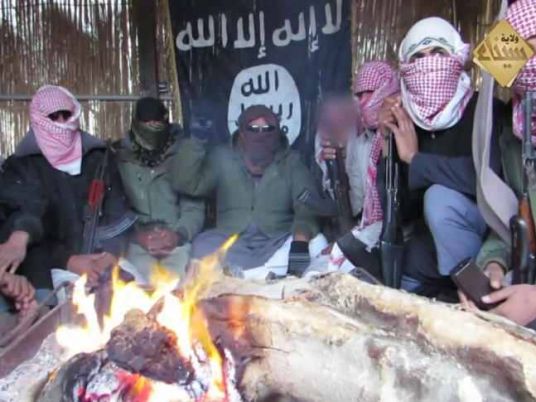
In the wake of raids by security forces that targeted an alleged IS militant stationing point in the Ard El Lewaa suburb of Giza on Sunday, many questions have been raised about the presence of the group in Egypt’s capital Cairo and other mainland cities.
Following the security forces simultaneous raids of two apartments in Ard El Lewaa during the early hours of Sunday morning, the Interior Ministry released a statement detailing their operation and the violent confrontations that ensued.
The security forces targeted members of the IS affiliated group Sinai Province who were based in the Ard El Lewaa suburb where they lived as “ordinary citizens,” according to the ministry statement. The statement also described them as “Takfirists” [a Muslim who accuses another Muslim of apostasy].
The statement added that the IS militants fled from North Sinai to Cairo to hide and prepare to carry out terrorist attacks in Greater Cairo.
“With the approach of the security raid towards two apartments located at Ard El Lewaa district for the sake of arresting the IS members, the raid’s force was met by shooting and one of the IS militants threw a bomb towards the forces, however it harmed him,” the statement read.
As a result, the raid’s forces opened fire on the militants. The gun battle led to the death of all eight militants.
Meanwhile, the forces also engaged in a shootout at a separate apartment with another two militants. The firefight led to the death of both of the militants, according to the statement.
The duel raids also led to the injury of three police officers, three conscripts from the Central Security Forces, in addition to the injury of an officer from the National Security Agency and another two police personnel.
Sunday’s raid was not the first of its type — several IS members who have received military training in North Sinai began moving to Cairo for the sake of preparing and implementing attacks.
In December 2016, Egypt’s President Abdel Fattah al-Sisi named the 22-year-old Mahmoud Shafiq as the suicide bomber who attacked a church attached to Egypt’s main Coptic Church in Cairo, killing more than 25 people.
Mahmoud Shafiq was reported to be a member of the IS affiliated group ‘Sinai Province’ who moved to Cairo for the sake of launching attacks there.
Directly after this attack, security forces launched intensive operations to arrest any IS members in Cairo and those who show affiliation to the group.
In January, the police said they had arrested a terrorist cell formed by five people who adopt IS ideology. The five had in their possession different types of guns in various areas of Cairo including El Marg, Ain Shams and Al-Salam.
In February, the Interior Ministry said that it arrested four people who formed a militant group known as Agnad Masr after a firefight between the two sides in Atfieh, Giza.
In June, security forces arrested four people from an apartment located in Giza’s suburb of Agouza over charges of forming a cell affiliated to IS.
In July, 11 people affiliated to IS were arrested in a residential apartment located inside Imbaba, Giza, where police seized large amounts of explosives.
Since 2013 following the overthrow of the Muslim Brotherhood, Egypt’s army and security forces have increasingly engaged in violent confrontations in North Sinai with Islamist insurgents. Hundred of security forces have been killed as well as hundreds of militants.
Most attacks have been claimed by Ansar Beit El-Maqdis, or Sinai Province, who pledged allegiance to the Islamic State group in 2014. The group considers the army and police apostates who should be killed for the sake of creating an Islamic Caliphate.




